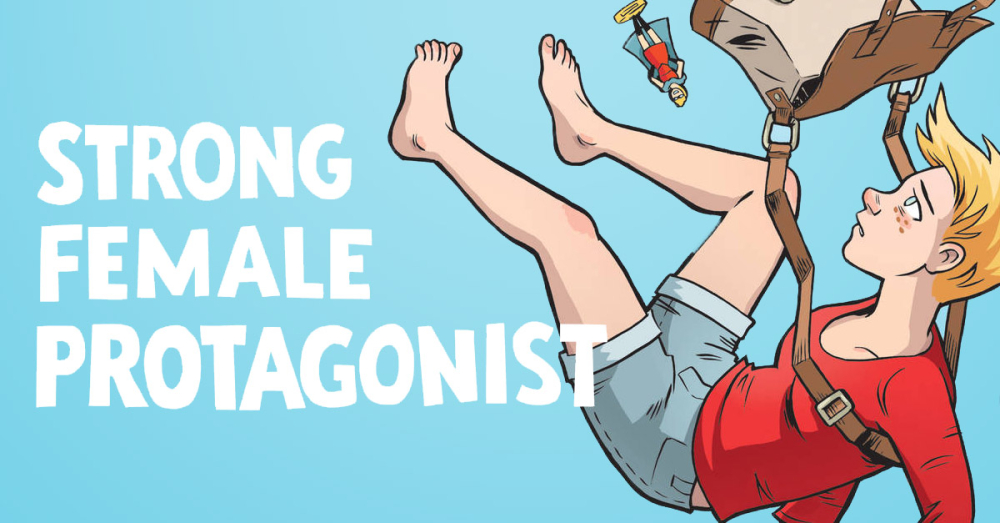Down with the Strong Female Character

Very often when writers deign to give us a strong female character, they are actually giving us a “Strong Female Character.” Meaning they give a woman a gun, or superpowers, and very little in the way of depth. Sure, she has a tragic backstory, but neither she nor her decisions are terribly complex. And it is all terribly annoying. We don’t want yet another idealized version of a female character. We want realistic female characters—flaws, complex thoughts, and all. And we want lots of them.
Strong Female Protagonist: Book One, written by Brennan Lee Mulligan with art by Molly Ostertag, takes all of that and wraps it up in a critique of the superhero genre, resulting in the most beautifully self-aware comic that is everything you never knew you wanted. The book itself is the result of a highly successful Kickstarter campaign that raised more than seven times the goal amount, and was published by the fabulous Top Shelf Productions. Top Shelf, one of the top indie comics publishers, was recently acquired by much bigger indie IDW Publishing, though they will remain a distinct imprint within IDW.
And now back to the book. Beware, ye who enter here, spoilers ahead, though I try to avoid anything too major.
The story’s premise, at first blush, is the perfect setup for a Superhero Story featuring a Strong Female Character. A series of freak storms span the globe in the early ’90s. Fifteen odd years later, some of the kids born in that time frame start developing superpowers. Our protagonist, Alison Green, is one of them. She becomes Mega Girl, invincible and super strong, with empowering catch phrases like, “Did anyone ever say you hit like a girl? ‘Cause you don’t,” as she rips a giant robot’s head off. She’s part of a team of other young superheroes who fight supervillains to protect the world. She’s everything pure and good (and privileged). And everything’s great.
Cue the record scratch.
This is not that story. This is the story of Alison Green, college student, champion of social justice: who outed her own secret identity and gave up being a superhero in the middle of a live talk show after she realized that she couldn’t do a damn thing to actually help the world as Mega Girl; who alternates between wanting to fix everything and fantasizing about killing people; who is angry and scared and maybe not a good person; who readily admits she has no idea what the hell she’s doing.
Alison is fascinatingly complex. She doesn’t need a man to come in and save her, but she also knows when to accept help. She wants to make the world a better place, but she readily admits she doesn’t know how to make that happen. When she loses her temper, she loses it in a spectacular fashion. She’s a compelling figure with a doomed quest: to fix the world once and for all.
Strong Female Protagonist offers the sort of self-aware critique of superheroes that this genre often doesn’t touch on:
I’ve been in the Pentagon like four times, but I’m not really even sure what the Pentagon does! I’m supposed to fight crime, but I don’t even know how laws get passed! … Am I the only one who’s scared that people are looking to me for answers because I can lift a car over my head?! This is crazy!
Alison has to deal with the stuff she’s done in a way that Superman, Batman, and the like don’t. It’s one thing to have your uncle die a la Peter Parker. It’s another, more complex thing to have to deal with a professor who flunks your philosophy paper because he doesn’t believe you can understand the human condition, hardened as he is by a loss that you inadvertently caused. While the classic superhero might have a much more deeply tragic story, Alison’s is nuanced and eerily relatable, for all that she can shred a chair with her bare hands. Killing off a hero’s family is, in many respects, the easy way out. That fact that Alison’s parents and sister are still alive allows for some intriguing family dynamics. How does a superhero’s mother feel watching her baby fight, live on TV? What’s it like to have to share your sister with the world? These are the questions Mulligan and Ostertag get to explore.
In this complex world, not everyone is in favor of superheroes, even when they’re clearly trying to help people. The line between good and bad is muddy at best. Alison flirts with her archnemesis turned good friend, who’s given up his supervillain lifestyle. Monstrous baddies like Cleaver, with fearsome blades for arms, are given humanizing backstories and clearcut motivations (and maybe a shot at redemption?).
What lies at the heart of the story, setting it apart from other superhero tales, is Alison’s constant dilemma about what superpowers mean for all of humanity. Her fear that “chromosomally stable people” (or non-super humans) will become totally passive, counting on superheroes to solve all of their problems, is indicative of our own current culture of passivity.
But for all that Alison’s trying to take the philosophical approach to saving the world, there are still plenty of fight scenes, mysterious figures, and uncertain alliances. This is an insanely fun read. Alison is, at heart, a snarky twenty-year-old, and she’s written like one. Mulligan’s pitch-perfect, often hilarious, sometimes heartrending dialogue is matched by Ostertag’s beautifully expressive art. If there is one book I could make everyone read from 2014, this is it.

Allyce Amidon is the associate editor at Foreword Reviews, where she blogs about comics and graphic novels. You can follow her on Twitter @allyce_amidon
Allyce Amidon
